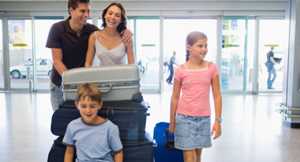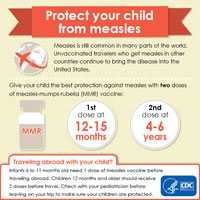For Travelers

Measles remains a common disease in many parts of the world, including areas in Europe, Asia, the Pacific, and Africa. Worldwide, 36 cases of measles per 1 million persons are reported each year; about 134,200 die. In the United States, most of the measles cases result from international travel. The disease is brought into the United States by unvaccinated people who get infected in other countries. They spread measles to others, which can cause outbreaks.
Anyone who is not protected against measles is at risk of getting infected when they travel internationally.
Travel Notices
Some U.S. travelers have become sick with measles after traveling abroad. Before you leave on an international trip, check the CDC Travel Notices on measles.
- Travel Notice: Watch (Level 1): Measles in Belgium
- Travel Notice: Watch (Level 1): Measles in Democratic Republic of the Congo
- Travel Notice: Watch (Level 1): Measles in France
- Travel Notice: Watch (Level 1): Measles in Germany
- Travel Notice: Watch (Level 1): Measles in Guinea
- Travel Notice: Watch (Level 1): Measles in Italy
- Travel Notice: Watch (Level 1): Measles in Indonesia
- Travel Notice: Watch (Level 1): Measles in Romania
Make Sure You’re Protected against Measles before International Travel
Before any international travel—
- Infants 6 months through 11 months of age should receive one dose of MMR vaccine.†
- Children 12 months of age and older should receive two doses of MMR vaccine separated by at least 28 days.
- Teenagers and adults who do not have evidence of immunity* against measles should get two doses of MMR vaccine separated by at least 28 days.
† Infants who get one dose of MMR vaccine before their first birthday should get two more doses (one dose at 12 through 15 months of age and another dose at least 28 days later).
* Acceptable presumptive evidence of immunity against measles includes at least one of the following: written documentation of adequate vaccination, laboratory evidence of immunity, laboratory confirmation of measles, or birth in the United States before 1957.
Get Vaccinated and Prevent Measles
Since measles is still common in many countries, unvaccinated travelers bring measles to the U.S. and it can spread. Protect yourself, you family, and your community with the measles-mumps-rubella (MMR) vaccine, especially before traveling internationally.
Also available on YouTube
Running Time: 1:00 minute
Date Released: 8/26/2015
Transcript [1 page]
- Page last reviewed: February 13, 2017
- Page last updated: March 3, 2017
- Content source:


 ShareCompartir
ShareCompartir
